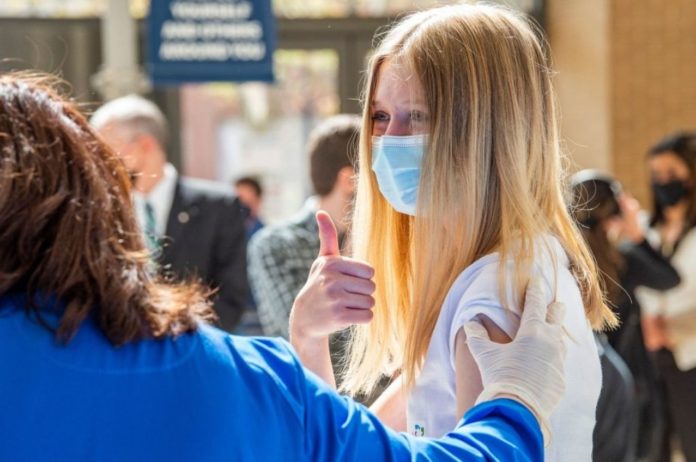Health officials in the United States have some reassuring news about the safety of the COVID-19 vaccine in teens: Serious side effects have been uncommon among the millions of US teenagers who have received Pfizer’s shots.
As of July 16, nearly 9 million young aged 12 to 17 had received the Pfizer-BioNTech vaccine, which was the only one approved for that age group. Approximately 91 percent of the approximately 9,240 reported side effects were minor, such as soreness near the vaccination site.
- Does This Mean We Stopped Being Animal and Started Being Human Due to ‘Copy Paste’ Errors?
- The One Lifestyle Choice That Could Reduce Your Heart Disease Risk By More Than 22%
- Aging: This Is What Happens Inside Your Body Right After Exercise
- Immune-Boosting Drink that Mimics Fasting to Reduce Fat – Scientists ‘Were Surprised’ By New Findings
- Gun Violence in America: What They Don’t Talk About at the Debate
However, 9% were serious, with 4% developing myocarditis, the US Centers for Disease Control and Prevention reported Friday.
“Local and systemic reactions are common among adolescents following Pfizer-BioNTech vaccine, especially after the second dose; however, serious adverse events after COVID-19 vaccination are rare,” said Anne Hause from CDC.
According to her, myocarditis was one of the most common severe adverse events reported. This is an inflammation of the heart muscle that can affect the electrical system of the heart, reducing pumping ability and causing rapid or abnormal rhythms.
Myocarditis is typically caused by a viral infection, such as COVID-19, but it can also be caused by a drug reaction. Chest pain, fatigue, shortness of breath, and arrhythmias are some of the signs and symptoms (abnormal heart rhythm).
While this association may appear to be concerning, CDC experts continue to emphasise the importance of vaccination for all people aged 12 and older. The vaccine has not yet been approved for use in children under the age of six.
Hause believes that getting vaccinated is better than contracting COVID-19.
“The benefits of vaccination in preventing COVID-19 and its complications continue to outweigh the potential risks of rare adverse events reported after vaccination,” she said.
A study published last week on the preprint server medRxiv found that teens were more likely to develop heart inflammation after receiving COVID-19 than after receiving the vaccine. Researchers compared the rates of heart inflammation in about 14,000 teens diagnosed with COVID-19 and a similar number of vaccinated teens who experienced side effects. When compared to the vaccination group, the risk of heart inflammation was 21 times higher in girls with COVID and about six times higher in boys with COVID.
“Vaccinating 12- to 17-year-olds remains the safer choice for this age group and will reduce school interruptions and transmission to others,” Mendel Singer, vice chair for education at Case Western Reserve University School of Medicine and co-author of the medRxiv study, agrees.
Dr. Paul Offit, director of the Children’s Hospital of Philadelphia’s Vaccine Education Center, agreed that the vaccine’s side effects are preferable to COVID-19’s devastating effects.
“You need to put it in perspective. First of all, it appears roughly only one in 20,000 recipients who are in the highest risk group will develop myocarditis after two shots,” he said.
“Myocarditis never sounds good. You can say mild myocarditis all you want, but it’s also going to scare people, because the inflammation of the heart muscle is always going to be seen as worrisome. But it does appear to be self-limiting, short-lived, not fatal and not associated with coronary artery abnormalities,” Offit said.
A recent study among 1,600 college athletes who had COVID-19 found that roughly one in 43 had myocarditis, he said.
“So you have basically one in 20,000 phenomena at its peak for the vaccine and a one in 43 phenomena with the disease.”
If symptoms of myocarditis appear, parents should take their child to the doctor, who may refer them to the hospital for observation, according to Offit.
To parents who are concerned about having their child vaccinated, Offit said, “Just know that the disease is common, that this (Delta) variant especially is highly contagious.”
He further highlighted that some believe that over the next few years, you’ll have two choices — to be vaccinated or to be naturally infected.
- Does This Mean We Stopped Being Animal and Started Being Human Due to ‘Copy Paste’ Errors?
- The One Lifestyle Choice That Could Reduce Your Heart Disease Risk By More Than 22%
- Aging: This Is What Happens Inside Your Body Right After Exercise
- Immune-Boosting Drink that Mimics Fasting to Reduce Fat – Scientists ‘Were Surprised’ By New Findings
- Gun Violence in America: What They Don’t Talk About at the Debate
“Vaccination is the safer choice, because natural infection also causes myocarditis at a much higher rate,” he said.
The disease is worse than the vaccine, Offit stressed. “That’s always true,” he said.
The report was published July 30 in the CDC’s Morbidity and Mortality Weekly Report.
Photo by JOSEPH PREZIOSO/AFP via Getty Images
